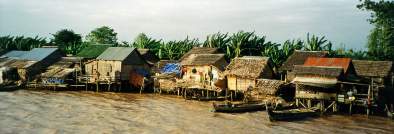


/ Southeast Asia
Season's Greetings
As we approach the end of 2025, we look back with gratitude on the achievements and collaboration we have shared throughout the year. Your continued commitment and partnership have been vital in advancing our mission and creating meaningful impact across the region.

/ Southeast Asia
Holiday Season Office Schedule and Service Update
As we approach the end of the year, please be advised that the GWP Southeast Asia physical office will be closed from 22 December 2025 to 4 January 2026.

/ Southeast Asia
Turning SDG 6.5 Data into Action: Advancing IWRM in Asia-Pacific
Bangkok, Thailand | December 10, 2025 - Global Water Partnership Southeast Asia (GWP-SEA) underscored the importance of translating SDG monitoring into concrete action during the Pan-Asia Training on International Water Law, held at the United Nations Economic and Social Commission for Asia and the Pacific (UN ESCAP). The event brought together regional water and legal experts to assess progress on SDG Target 6.5, with a focus on integrated water resources management (IWRM) and transboundary cooperation

/ Southeast Asia
Pan-Asia Water Law Training: Urgent Need for Transboundary Cooperation
Bangkok, Thailand | December 09, 2025 - The inaugural Pan-Asia Training on International Water Law (IWL) brought together more than a hundred experts, government officials, and water practitioners from across Asia for a week-long training held from 8 - 11 December 2025. Hosted in Bangkok, Thailand, the programme aimed to strengthen knowledge, legal capacity, and cooperation frameworks for managing shared water resources.

/ Southeast Asia
Tracing the Civilizational Footprints of the Archipelago: Reconnects Water, Climate, and Heritage
Indonesia, 10 November 2025 — The Department of Geophysics, Institut Teknologi Sepuluh Nopember (ITS), hosted a webinar titled “Jejak Peradaban Nusantara” or translated as “Traces of Nusantara Civilization” to explore the origins and legacy of Indonesia’s civilization. The event aimed to introduce the nation’s rich and genuine cultural heritage and inspire further study and adaptation of ancient wisdom for today's and future generations.

/ Southeast Asia
Building Capacity for Climate-Resilient River Water Quality Management in Malaysia
On 7–8 October 2025, water professionals and practitioners gathered in Kuala Lumpur, Malaysia, for a hands-on workshop aimed at strengthening national capacity in river water quality management. The two-day training was jointly organized by the Malaysian Water Partnership (MyWP), the Global Water Partnership Malaysia (MyGWP), and the Department of Irrigation and Drainage (DID) Malaysia, with implementation support from the MyGWP Secretariat, DID Malaysia, and a hired consultant and trainer.

/ Southeast Asia
Indonesia Moves Forward to a Water-Secure Future
Jakarta, Indonesia | September 13, 2025 - At Water Indonesia 2025, the Indonesian Water Association (IdWA) and the Global Water Partnership Southeast Asia (GWP SEA) gathered experts to discuss how Indonesia can move from water scarcity to sustainable solutions.

/ Southeast Asia
Exploring the Gendered Impacts of Technology in Water Management: Insights from the Philippines’ Roundtable Discussion
The Roundtable Discussion (RTD) on “The Impacts of Technology on Men and Women Engaged in Integrated Water Resources Management (IWRM)” was successfully held on June 26, 2025 (Thursday) at the University Hotel, University of the Philippines Diliman Campus, Quezon City.

/ Southeast Asia
GWP SEA and AgroEcoVeda Forge Stronger Collaboration at Young AgroEcoVisionary 2025
Bali, Indonesia | August 15, 2025 – The Young AgroEcoVisionary 2025 international student competition gathered bright young innovators from ASEAN universities to design practical environmental solutions for the region. Held from 2–17 August 2025 in Bali, Indonesia, the event combined knowledge exchange, teamwork, and innovation to address pressing issues such as wastewater treatment, sustainable land use, and circular economy approaches.

/ Southeast Asia
Malaysia Prepares for the 2026 SDG 6.5.1 Integrated Water Resources Management Reporting
Malaysia is required to report on its progress toward achieving the 17 Sustainable Development Goals (SDGs) to the United Nations (UN). The Department of Irrigation and Drainage (DID) Malaysia serves as the National Focal Point for SDG Indicator 6.5, which aims to “implement integrated water resources management at all levels, including through transboundary cooperation as appropriate” by 2030.